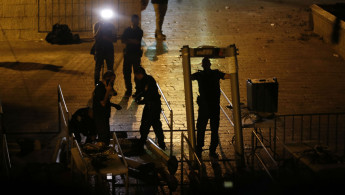Israel removes metal detectors from sensitive al-Aqsa mosque, says 'smart technology' to be installed
A work crew could be seen in the early hours of Tuesday removing the metal detectors at the Lion's Gate of the holy site, which is the third holiest site of Islam and the holiest of Judaism.
A statement from Prime Minister Binyamin Netanyahu's office said that metal detectors would be removed and replaced with "security inspection based on advanced technologies and other means".
The statement failed to elaborate on the form the future smart security measures will take.
Religious leaders in Jerusalem said they rejected any additional security measures during a press conference on Monday, calling on Israel to return security on the site to the "status-quo prior to the crisis".
The removal of the devices followed the resolution of a 24-hour diplomatic standoff with Jordan over a deadly shooting at the Israeli Embassy in the kingdom, suggesting a broader deal had been struck.
Netanyahu and Jordan's King Abdullah spoke by phone late on Monday to discuss the crises, including the tensions over the 37-acre sacred esplanade in Jerusalem's Old City.
Jordan is the official custodian of Muslim holy sites in Jerusalem.
As word spread of the decision, a few hundred Palestinians gathered to celebrate near an entrance to the Haram al-Sharif mosque compound, known to Jews as the Temple Mount.
One person set off a firework, prompting Israeli police to raid and disperse them using sound grenades.
Israel installed metal detectors at entrances to the site, which includes the al-Aqsa mosque and the Dome of the Rock, after an attack on July 14 that killed two policemen.
The move incensed Palestinians, amid allegations that Israel was trying to expand control over the site under the guise of security. They refused to enter the compound in protest and prayed in the streets outside instead.
Israeli authorities said the metal detectors were needed because the July 14 attackers smuggled guns into the site and emerged from it to shoot the officers.
Clashes have broken out during protests over the measures, leaving five Palestinians dead.
The holy site in Jerusalem has served as a rallying cry for Palestinians.
In 2000, then Israeli opposition leader Ariel Sharon's visit to the compound helped ignite the second Palestinian intifada, or uprising, which lasted more than four years.
It is in east Jerusalem, seized by Israel in the 1967 Six-Day War and later annexed in a move never recognised by the international community.





 Follow the Middle East's top stories in English at The New Arab on Google News
Follow the Middle East's top stories in English at The New Arab on Google News
![Israeli forces ordered bombed Gaza's Jabalia, ordering residents to leave [Getty]](/sites/default/files/styles/image_330x185/public/2176418030.jpeg?h=a5f2f23a&itok=_YGZaP1z)

